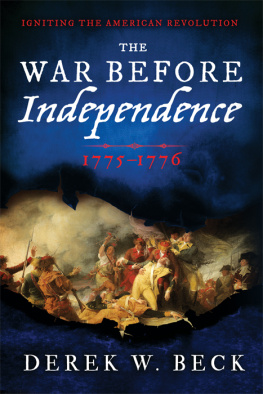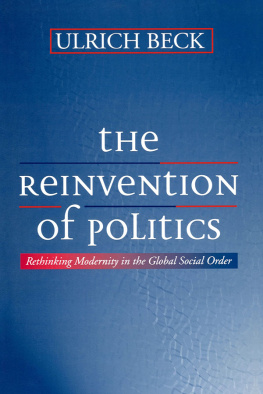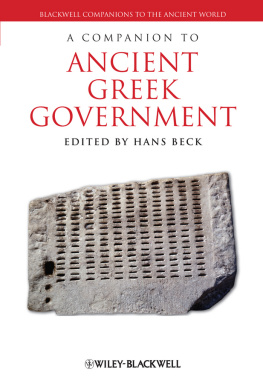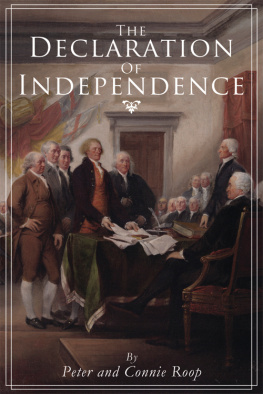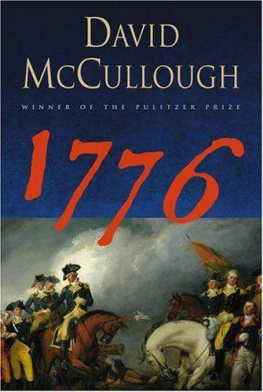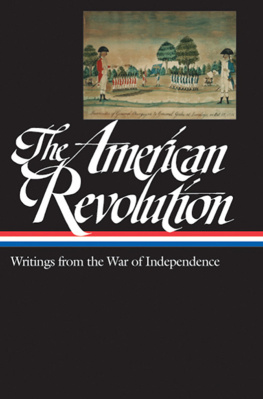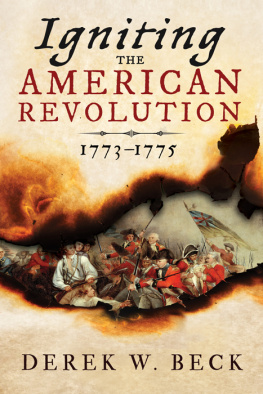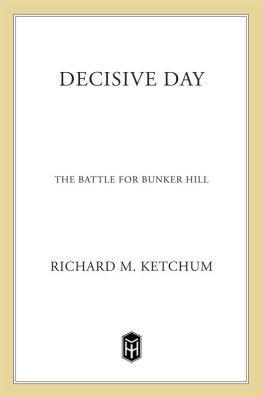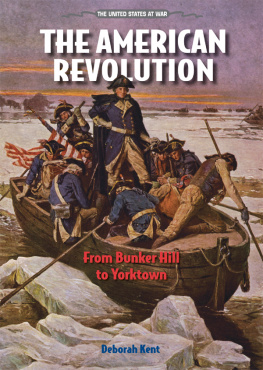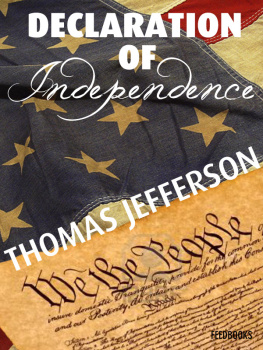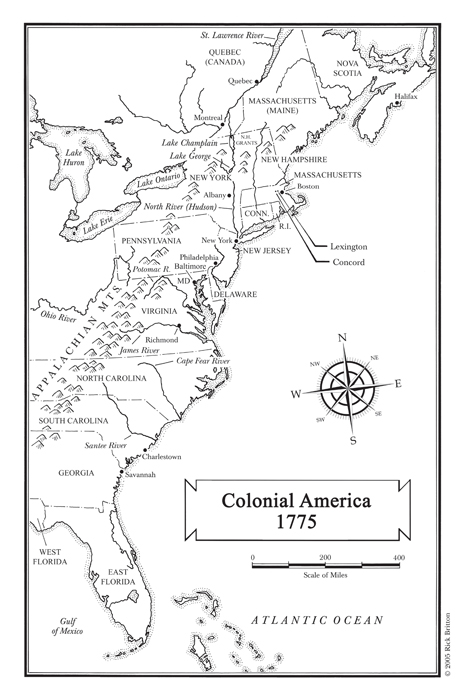Copyright 2016 by Derek W. Beck
Cover and internal design 2016 by Sourcebooks, Inc.
Cover design by The Book Designers
Cover image: Attack on Quebec, December 31, 1775, c. 1786 (oil on canvas), Trumbull, John (17561843)/Yale University Art Gallery, New Haven, CT, USA/Bridgeman Images. Full citation and image on .
Inside front cover map: Boston, its environs and harbour (1778 variant) by Thomas Hyde Page (17461821), based on surveys of John Montresor, published by William Faden (17491836). Courtesy of the Norman B. Leventhal Map Center at the Boston Public Library.
Inside back cover map: Boston, its environs and harbour (1775 variant) by Thomas Hyde Page (17461821), based on surveys of John Montresor. Library of Congress, Geography and Map Division.
Colonial America 1775 on page xii Rick Britton
Maps of Bunker Hill, . Cartography by Rick Britton. 2016 Derek W. Beck
The Two American Expeditions to Quebec in Late 1775 on page 255 2016 Derek W. Beck
Plan of the city and environs of Quebec1775 to1776 by William Faden (17491836) on . Courtesy of the Norman B. Leventhal Map Center at the Boston Public Library.
Sourcebooks and the colophon are registered trademarks of Sourcebooks, Inc.
All rights reserved. No part of this book may be reproduced in any form or by any electronic or mechanical means including information storage and retrieval systemsexcept in the case of brief quotations embodied in critical articles or reviewswithout permission in writing from its publisher, Sourcebooks, Inc.
This publication is designed to provide accurate and authoritative information in regard to the subject matter covered. It is sold with the understanding that the publisher is not engaged in rendering legal, accounting, or other professional service. If legal advice or other expert assistance is required, the services of a competent professional person should be sought. From a Declaration of Principles Jointly Adopted by a Committee of the American Bar Association and a Committee of Publishers and Associations
Published by Sourcebooks, Inc.
P.O. Box 4410, Naperville, Illinois 60567-4410
(630) 961-3900
Fax: (630) 961-2168
www.sourcebooks.com
Library of Congress Cataloging-in-Publication Data
Names: Beck, Derek W., author.
Title: The war before independence, 1775-1776 / Derek W. Beck.
Description: Naperville, Illinois : Sourcebooks, 2016. | Includes
bibliographical references and index.
Identifiers: LCCN 2015049006 | (hardcover)
Subjects: LCSH: United StatesHistoryRevolution, 1775-1783Campaigns.
Classification: LCC E231 .B43 2016 | DDC 973.3dc23 LC record available at http://lccn.loc.gov/2015049006
To my loving parents, Katherine and Maurice. You taught me, inspired me, and gave me the tools to write this book. Thank you both for your love and support.
Contents
Preface
While this book can be enjoyed on its own, it is a continuation of the story left off in Igniting the American Revolution: 17731775 . As described more fully in that volumes preface, I strive to paint events in this series with accuracy and objectivity. Such an unbiased approach will at times suggest the Americans are the bad guys and the British the good guys. I embrace these shades of gray to present both sides of the war as authentically as possible, and my extensive research includes both Yankee and British perspectives. For the same reason, I generally avoid the word patriot , which means a lover of ones country, because both sides were fighting to maintain (and for the love of) their respective lands or empire. My hope is that this provides an honest look at the events of the early war. Some readers may prefer to adhere to the perspective of older history books that paint the Americans as superheroes, and thus call me an Anglophile for this unbiased attempt. But I think my continued honorable service in the modern American military refutes any such claims. Rather, I would prefer to be called a lover of truth. (Sadly, I can find no word for this: veritophile?) Truth is where real history is to be found.
Authors Note: This volume employs logical quotations, meaning the only punctuation appearing inside quotation marks is also in that position in the original as well. So, a quotation ending with a comma inside the quotation marks, such as quotation, indicates the comma was there in the original, while one with the comma outside the quotation marks, such as quotation, indicates the comma is not part of the original. This style is observed for emphasis or scare quotes in the main text as well. See the bibliography for more.
Acknowledgments
Because I wrote this volume simultaneously with Igniting the American Revolution: 17731775 , the same gratitude I expressed in that volume should be repeated here. However, in the interest of space and avoiding repetition, I would like to give special acknowledgment to those who made the later phases of this publication possible.
First, thank you to my loving wife, Vicky, who gave up her free time with me so I could edit this book, and who ran much of our home renovation while I focused mostly on writing and working. You are a blessing.
I also wish to express my deep gratitude to my new Sourcebooks editor, Grace Menary-Winefield, who helped hone this book into something worthy of publication, and who took the lead in the final phases of the first books publication as my champion to see it to success. And thank you to my literary agents, Doug Grad and Jacqueline Varoli Grace, as well as my first editor, Stephanie Bowen, who all took a chance on a manuscript that was really two books in one. Thanks to all of you for believing in the words on these pages and bringing them to the world.
Finally, thanks to my trusted colleague Dr. Samuel A. Forman, who kindly offered feedback and encouragement when the manuscript was still rough. And thank you to Don N. Hagist, whose insightful technical feedback helped me to understand British military units and their organization. You have both made this book stronger.
Part 1
Commitment to War
(Mid-May to October 1775)
CHAPTER 1
Mounting Tensions
The great schism that had formed between Britons and Americans tore holes in friendships and families. One lady of Philadelphia wrote to a British officer in Boston, I assure you that though we consider you as a public enemy, we regard you as a private friend; and while we detest the cause you are fighting for, we wish well to your own personal interest and safety.
Benjamin Franklin felt this schism more directly. When he first arrived in London, he was the most noted and celebrated American, but when he left there in mid-March of 1775, he did so as a dejected outcast. This great schism was more than just a political or professional upheaval for Franklin: it also divided his own family. When he arrived in Philadelphia in early May, he cast his lot firmly with the Whigs, joining the Second Continental Congress as a Pennsylvania delegate.
This schism was never more apparent than in and around Boston. After the Destruction of the Tea in December 1773, Britain overreacted by closing the Port of Boston and placing large numbers of troops in the town. Tensions grew as quickly as the British garrison, and on April 19, 1775, when the British attempted to disarm the American war stores in nearby Concord, those tensions erupted into open violence, thus igniting the American Revolution. American militia forces swarmed from the countryside and chased the British back to Boston, where both sides now dug in for warliterally. While the Americans concentrated their entrenching efforts in and around nearby Cambridge to protect their new headquarters, the British fortified Boston Neck and all the hills in the peninsular town.

